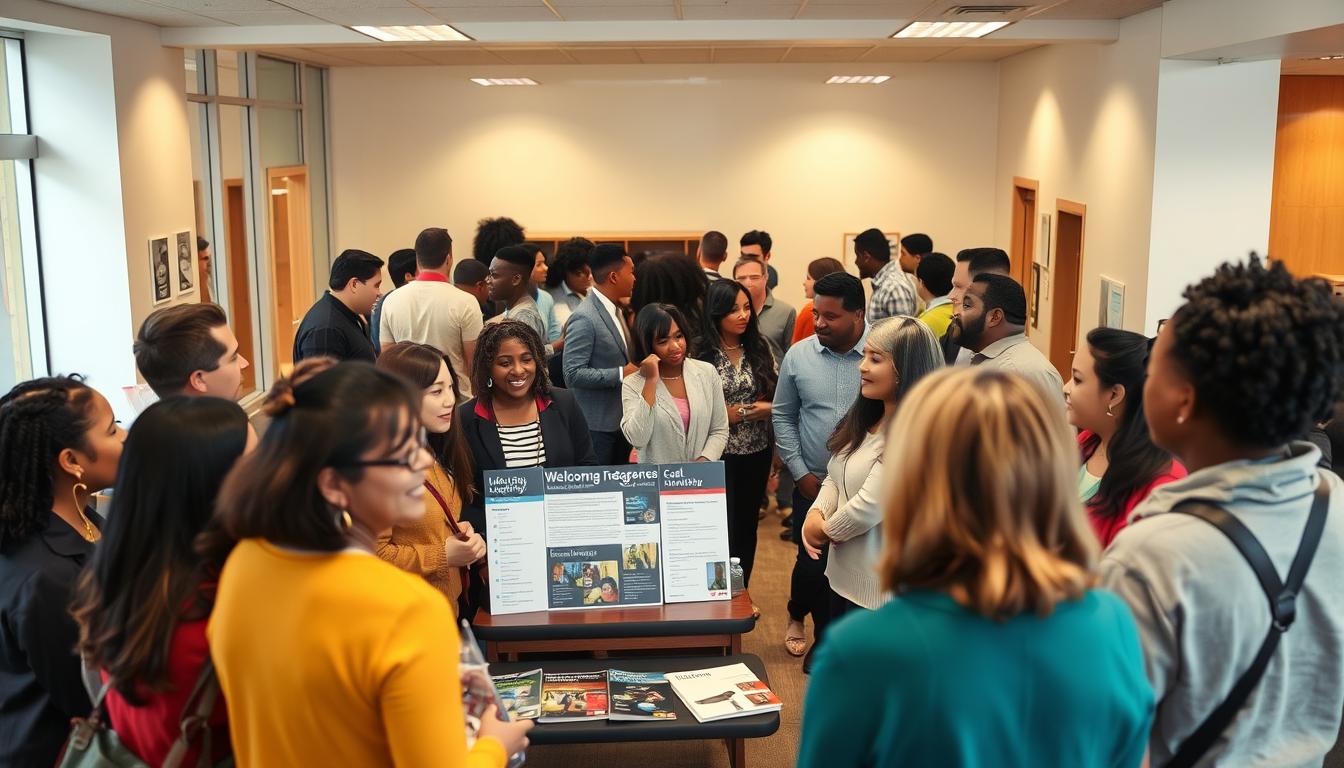Where to Find the Best Networking Opportunities as a Student
Anúncios
Building meaningful relationships during school years creates bridges to future career growth. While many associate professional connections with college or workplace settings, early engagement helps learners gain confidence and access hidden career paths. Authentic conversations often lead to internships, mentorships, and collaborations long before graduation.
Young adults often underestimate how everyday interactions can shape their futures. Club meetings, volunteer projects, and even casual campus events offer chances to connect with peers and professionals. These interactions become stepping stones, revealing unadvertised roles and industry insights.
Starting this process in high school provides a low-pressure environment to practice communication skills. Teachers, coaches, and local business leaders frequently serve as unexpected resources. Over time, these connections evolve into a support system that accelerates career readiness.
Effective relationship-building focuses on mutual value rather than transactional exchanges. Listening actively and showing genuine interest in others’ work fosters trust. This approach transforms brief encounters into lasting professional alliances that withstand career shifts.
The following guide explores practical strategies for creating these bonds across educational stages. From structured career fairs to spontaneous coffee chats, multiple pathways exist for every personality type. With practice, anyone can master this critical skill for long-term success.
Understanding Student Networking Opportunities
Strategic interactions in educational settings unlock doors to future achievements. While academic performance remains vital, relationship cultivation often determines access to unadvertised roles and insider knowledge. This proactive approach helps individuals stand out in competitive markets where trust and personal referrals carry weight.
Why Connections Matter Early
Many entry-level positions never appear on job boards—they’re filled through professional circles. Building rapport with industry experts creates pathways to these hidden openings. Mentorship from seasoned practitioners often shapes academic choices and internship pursuits more effectively than classroom theory alone.
Long-Term Career Advantages
Regular engagement with field specialists develops crucial abilities:
- Articulating ideas clearly in professional settings
- Adapting communication styles across generations
- Recognizing emerging industry patterns
These interactions foster mutual growth—seasoned professionals gain fresh perspectives while learners acquire practical wisdom. Over time, these bonds evolve into collaborative partnerships that accelerate career development during pivotal transitions.
Utilizing Campus Events and Career Fairs
Educational institutions serve as launchpads for professional growth through structured engagement platforms. Over 80% of universities host annual career fairs where learners connect directly with industry leaders. These gatherings bridge academic knowledge with real-world applications, offering insights into company cultures and hiring trends.
Maximizing Networking at Career Fairs
Prior research separates standout participants from casual attendees. Reviewing exhibitor lists and company websites helps craft targeted questions. “What skills do your top interns consistently demonstrate?” sparks deeper dialogue than generic inquiries.
Bringing multiple resume versions tailored to different industries shows adaptability. A concise 30-second introduction highlighting relevant coursework or projects keeps conversations focused. Collecting business cards enables prompt follow-up emails referencing specific discussions.
Preparing for Campus Events Effectively
Career centers often provide mock interviews and pitch workshops before major fairs. Attending employer-led panels reveals industry pain points to reference during interactions. Dressing professionally while adding a unique accessory helps recruiters recall conversations later.
Creating a spreadsheet to track contacts and follow-up deadlines prevents missed connections. Sending LinkedIn requests within 48 hours reinforces first impressions. Many professionals appreciate brief thank-you notes highlighting key takeaways from their discussions.
Leveraging Social Media and Online Platforms
Digital spaces now serve as gateways to career advancement for ambitious learners. Platforms once used for casual interactions now host thriving professional communities. A polished online presence helps young adults showcase their capabilities to global audiences.
Building a Professional Profile on LinkedIn
LinkedIn profiles act as dynamic resumes that evolve with each achievement. Highlighting coursework, volunteer work, and technical skills paints a complete picture of potential. Customized headlines like “Aspiring Data Analyst | Python Enthusiast” immediately communicate focus areas.
Advanced search tools help locate alumni working in target companies or roles. Joining niche groups related to specific industries fosters knowledge exchange. Sharing articles about emerging trends demonstrates proactive learning while attracting like-minded connections.
Engaging with Industry Leaders on Social Media
Platforms like X (Twitter) host real-time conversations about industry developments. Commenting thoughtfully on posts from experts shows genuine interest rather than superficial outreach. Many professionals appreciate when followers add value to discussions with fresh perspectives.
Instagram portfolios display creative work for fields like design or photography. Following hashtags related to career goals surfaces relevant events and thought leaders. Transitioning online rapport to coffee chats or virtual meetings often cements these digital connections.
Joining Organizations, Clubs, and Alumni Networks
Campus communities offer fertile ground for cultivating professional alliances that extend far beyond graduation. Groups centered around academic disciplines or shared passions create organic spaces to collaborate with driven peers and engaged faculty members.
Exploring Student Clubs and Professional Societies
Specialized societies bridge classroom learning with real-world applications. A biology honor society might host lab tours with local researchers, while an engineering group could organize hackathons attended by tech recruiters. Active participation often leads to unexpected collaborations—like co-authoring research papers or launching startup concepts.
Leadership roles in these groups demonstrate initiative to potential employers. Planning speaker series or coordinating volunteer projects builds transferable skills while expanding visibility within academic and professional circles.
Connecting with Professors and Alumni
Faculty members frequently serve as gateways to industry insights. As one economics professor notes: “My best internship recommendations go to learners who regularly contribute to class discussions and seek extra reading suggestions.” Office hours become strategic touchpoints when used to discuss career trajectories alongside coursework.
Alumni databases provide direct lines to graduates in target fields. A thoughtful message referencing shared experiences—like competing in the same case competitions—often sparks mentoring relationships. Many universities host mixers where current learners can discuss market trends with graduates now shaping those industries.
Maintaining these connections requires consistent but genuine engagement. Brief updates about academic achievements or career milestones keep relationships active without overwhelming busy professionals. Over time, these cultivated bonds often evolve into references, collaborators, or even business partners.
Conclusion
Mastering relationship-building transforms academic journeys into career launchpads. While technical expertise matters, strategic connections often determine access to unadvertised roles and industry insights. Organizations like NSHSS streamline this process by connecting motivated individuals with mentors and peers who share their drive.
Early efforts to cultivate a professional network yield compounding returns. Internships and collaborative projects frequently emerge from casual conversations at club meetings or community events. These experiences sharpen communication skills while revealing practical applications for classroom knowledge.
Consistent engagement proves more valuable than sporadic outreach. A brief monthly check-in with contacts maintains relationships without overwhelming either party. Many professionals appreciate updates about academic milestones or relevant achievements.
Every conversation holds potential—whether discussing industry trends with alumni or troubleshooting coding challenges with classmates. These interactions collectively build a support system that accelerates career development during pivotal transitions. Start forging those bridges today, and watch tomorrow’s opportunities unfold.
FAQ
How can college events help in building professional relationships?
What role does LinkedIn play in career development?
Why should someone join clubs related to their field of study?
How can alumni networks support recent graduates?
What strategies make social media engagement effective for career growth?
Published on: 28 de July de 2025

Luke Martin
Luke Martin, author of Credwallets.com, is a mathematics graduate with a specialization in financial markets. Known for his love of pets and his passion for sharing knowledge, Luke created the site to provide valuable insights into the complexities of the financial world. His approachable style and dedication to helping others make informed financial decisions make his work accessible to all, whether they're new to finance or seasoned investors.







